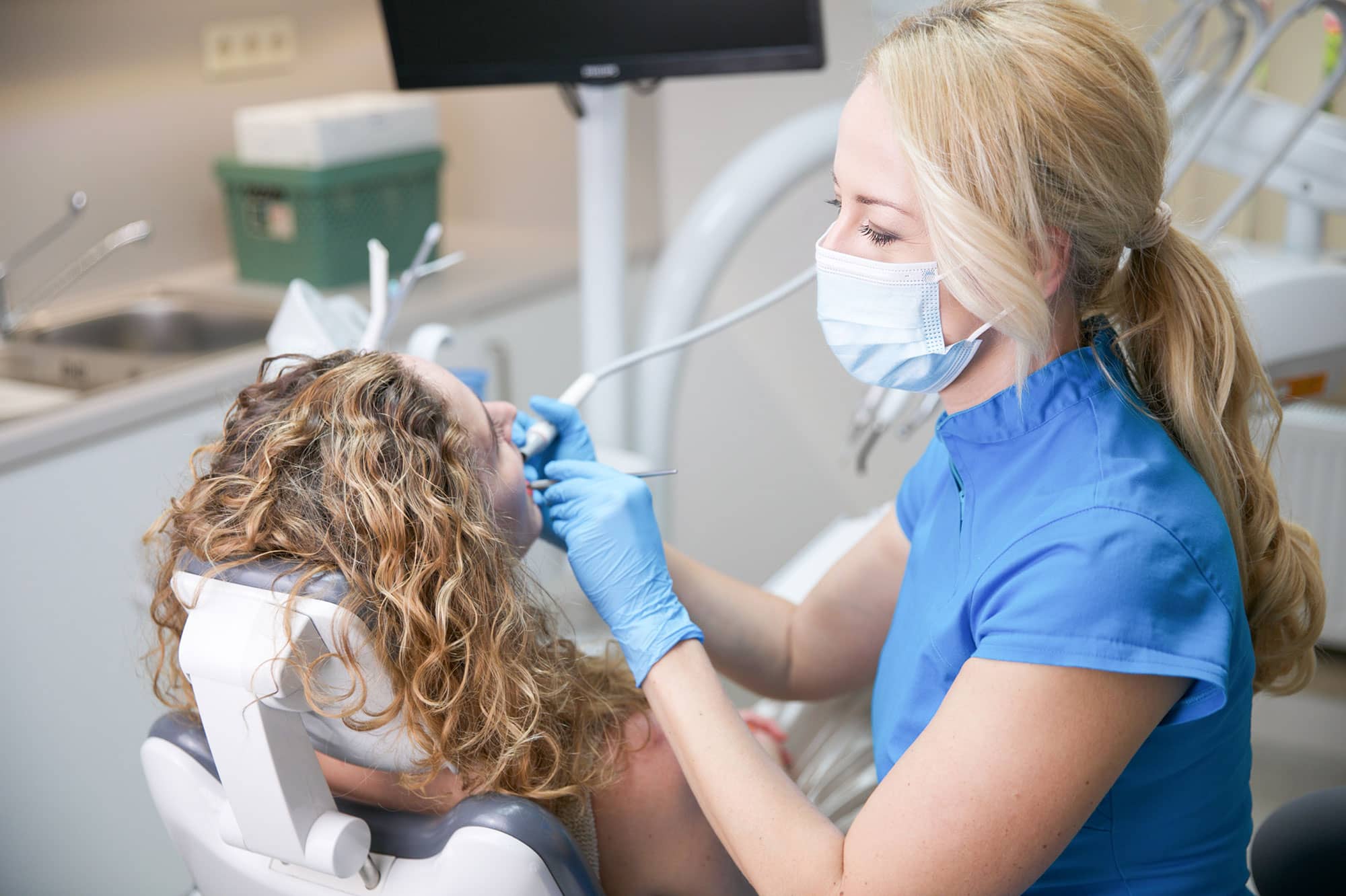In certain cases a bone grafting operation must be carried out before a dental implantation. Although it sounds frightening, it is a routine procedure with minimal intervention. During bone grafting the missing bone in the jaw is augmented. With this we ensure a solid base for the dental implantation.
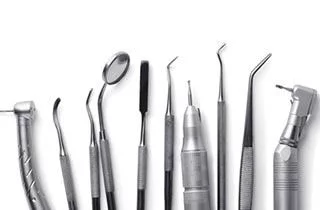 The main points of the article are the following:
The main points of the article are the following:
- Reasons and symptoms of bone defects. Reversal of process
- Main types of bone grafting
- A special bone grafting is lifting the base of maxillary sinus (Sinus lift)
- Process of bone grafting
- Dental bone graft complications. Possible risks of bone grafting
- Advice on mitigating complications after bone grafting for dental implants.
Reasons and symptoms of bone defects. Reversal of the process
A long-lasting prosthesis, a far gone periodontal disease or tooth loss in an accident can lead to bone defect. Furthermore, smoking has a serious risk factor in this disease.
In the beginning the damage is hardly recognisable, because tooth loss does not really come together with significant pain. The main symptoms of a far gone bone defect are the following: bleeding gums, sensitive and swollen palate, bad breath, loose teeth and a weakening bite.
Due to bone grafting, if our body accepts the new material after the process, the new live bones can start to develop. A strong jaw is needed for other operations such as implantation.
Main types of bone grafting
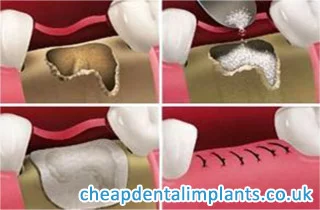
The bone used during bone grafting has human and synthetic origin. The human bone can stem from the patient’s own body or a donor.
The specialist makes the decision on the exact type of bone grafting after consulting with the patient and examining his/her conditions.
The dentist takes into consideration all important factors from the patient’s background; furthermore, he/she carries out physical examinations before the operation.
Here are the different bone grafting procedures. Some risk factors and advantages are also listed in certain categories.
Bone grafting with your own bone
For this process the bone is taken from another part of the patient’s own body. Then it is fixed onto the place where the bone grafting will be done.
In order to reach full recovery and to reduce the danger of rejection the safest way is to do bone grafting with own bones.
Bone grafting with a donor
The donor can be another living person, a dead person or even an animal.
Its indisputable advantage is that there is no need of multiple operations on the patient. This way the risk of contamination decreases. Of course, the bone to be grafted has gone through strict examinations before grafting. Moreover, antibiotics are applied on it and it is treated with materials supporting ossification.
Bone grafting with synthetic materials
Owing to the continuous improvement of surgery technology there are high quality synthetic materials available today.
The biggest advantage of synthetic materials is that they do not contain living cells. Therefore, the risk of ejection is quite low. Since the bone used in bone grafting does not contain living bone marrow, there is no need to have matching blood groups between donors and patients.
These are biodegradable materials which are quite safe. In certain cases, though, it can be harder for the body to accept them.
A special bone grafting is lifting the base of the maxillary sinus. (Sinus lift)
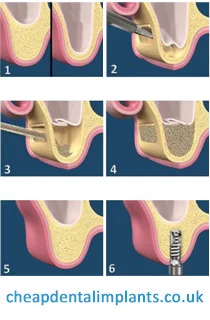
If the jaw is too thin on the territory of side teeth of the upper jaw, you need to lift the base of the maxillary sinus.
In this case the upper jaw is opened towards the maxilla. From the surface of the maxilla its covering mucosa is cut during surgery. Then it is lifted up gently. In its place there will be a hole which is being filled with the bone grafting material.
Due to the operation the bone layer of the upper jaw becomes thicker during healing. Thus, the tooth implantation can be directly inserted.
Process of bone grafting
Before the operation your dentist makes a thorough examination and checks your previous medical history. Thereafter he makes a decision together with you on the type of bone grafting. The specialist tells you all related information about the process.
Bone grafting is carried out with anaesthetisation. Thus, patients feel no pain during the intervention.
Depending on the chosen process the specialist makes the necessary cut or cuts and carries out the implementation with the chosen material. At the end he/she closes the surgical wound.
After the operation the dentist explains all necessary information to the patient. Later on controls and, if it is needed, implantation interventions are done. It can happen that the bone grafting and the implantation process take place at the same time.
How long does it take to heal after bone grafting?
The healing time after bone grafting depends on many factors:
The surface of the bone structure: The larger the volume of bone to be built up, the longer it usually takes to heal. The type of bone material used: Synthetic materials heal faster than the body’s own bone material. Individual healing ability: Everyone heals at a different rate. In minor cases: The recovery phase can be completed after a few weeks, but after major procedures recovery can take up to six months or longer.
Dental bone graft complications. Possible risks of bone grafting
Owing to the modern medical science complications of bone grafting have been reduced to a minimum. However, like all operations, it also has some risks.
After bone grafting you can experience the common side-effects of surgeries (such as bleeding, danger of contamination, bad reaction to anaesthetisation).
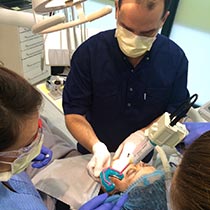
- pain,
- swelling,
- nerve damage,
- implanted material gets rejected,
- inflammation, Periimplantitis
- absorption of implanted material,
How do you recognise periimplantitis?
Periimplantitis is an inflammation of the tissue surrounding a dental implant. Symptoms: The gums around the implant can be red, swollen and sensitive and can bleed even under slight pressure. Pain can occur, especially when chewing, but an unpleasant taste in the mouth can also indicate inflammation. In advanced stages, pus can form. In severe cases, the implant can become loose.
Is periimplantitis curable?
Periimplantitis is curable: It can usually be cured with antibiotics and a thorough cleaning of the gum pockets by a dentist. Advanced periimplantitis may require surgical intervention.
Symptoms of side-effects after most operations can be treated or mitigated quite well. In more serious cases the material implanted during bone grafting gets rejected, or it does not properly develop with other parts of the skeleton. When experiencing this, it can happen that another intervention is necessary after the operation. Then the implanted material is taken out and another bone grafting procedure is carried out on the patient.
In the last point you can read about some useful tips how to mitigate symptoms of side-effects after bone grafting.
Advice on mitigating complications after bone grafting for dental implants.
 Medicine
Medicine
Like all operations bone grafting also comes together with an unpleasant feeling. Usually the pain during intervention is not really severe. It is similar to the pain experienced during tooth extraction.
The anaesthetisation before the operation, anti-inflammatory drugs prescribed by the doctor can help in tolerating the pain and they help in the healing of surgical wounds.
Chilling
Bone grafting generally causes swelling. Besides medicine, chilling is also very useful after the operation since it mitigates swelling and bleeding; and the pain.
Diet
As long as you feel the impact of anaesthetisation, do not eat or drink. After bone grafting you need to keep a diet prescribed by the dentist.
The diet is tailor-made for each person. In general, we can say you need to avoid crunchy or hard food where you chew too much. Stop drinking coffee, tea or alcohol if possible. Smoking is strictly prohibited for patients suffering from bone defect.
Cold liquids and juices are the best choice after bone grafting. Other recommended food is different soups and shakes. Food demanding less chewing like mashed potatoes, oat flakes, scrambled eggs, pudding should be consumed according to the dentist’s prescriptions.

Sleeping
After bone grafting patients are advised to sleep on their back. Put the pillow under your head to reduce the risk of further bleeding in the area of operation.
If sleeping on your back, though, causes a problem for you, turn to the opposite side of the area of operation.
Lifestyle
After bone grafting take off some days to relax. Avoid demanding activities.
Dental care
For teeth care please use a toothbrush with soft brush fibres after the operation.
Others
In case of any unexpected, exaggerated or extraordinary complications or cases not listed in this article, feel free to contact your dentist.
What if the bone graft does not work?
It is important to know that even with osteoplasty, success is not always guaranteed. Implants cannot be inserted: Without sufficient bone support, dental implants cannot be inserted safely. Treatment time is extended or fails: If the bone graft is not successful, another procedure must be planned, which extends the overall treatment time. Increased costs: Additional procedures lead to higher treatment costs. Psychological stress: Unsuccessful bone reconstruction can be frustrating and stressful for the patient. From our article, it is clear that there is a solution for healing the injured jaw. Thanks to modern technology, even in the case of more serious damage, you do not have to forego the appropriate restoration of the gapped teeth.
As our article reveals, there is an appropriate solution for healing damaged jaws. Thanks to modern technology we do not have to give up restructuring our missing teeth even if they are in a serious stage.
